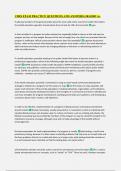, Chapter 01
The Scope and Challenge of International Marketing
True / False Questions
1. For companies today, becoming international is a luxury only some can afford.
True False
2. Companies from Japan are the leading group of investors in the United States.
True False
3. International marketing involves selling of a company’s goods and services to
consumers or users in more than one nation for a profit.
True False
4. The difference between domestic and international marketing lies in the different
concepts of marketing.
True False
5. An international marketer must deal with at least two levels of uncontrollable
uncertainty.
True False
6. The geography and infrastructure of a country are uncontrollable factors that
influence the business decisions of a company in an international market.
True False
7. The uncontrollable factors affecting international marketing are limited to political
forces, economic climate, and competitive structure.
True False
1-1
© 2013 by McGraw-Hill Education. This is proprietary material solely for authorized instructor use. Not authorized for sale or distribution in
any manner. This document may not be copied, scanned, duplicated, forwarded, distributed, or posted on a website, in whole or part.
,8. The level of technology in a country is an uncontrollable element for international
marketers.
True False
9. The uncontrollable factors a company has to deal with decreases with the number of
foreign markets in which it operates.
True False
10. The controllable elements can be altered in the long run and, usually, in the short run
to adjust to changing market conditions, consumer tastes, or corporate objectives.
True False
11. Political and legal forces, economic climate, and competition are some of the
domestic environment’s controllable factors.
True False
12. The foreign policies of a country have a direct effect on a firm’s international
marketing success.
True False
13. Abolition of apartheid in South Africa is an example of a positive uncontrollable
element in an international marketing scenario.
True False
14. The business activities of international marketers are not affected by competition in
their domestic market.
True False
15. The process of evaluating the uncontrollable elements in an international marketing
program involves substantial doses of cultural, political, and economic shock.
True False
16. Level of technology remains unchanged across countries making it a fairly predictable
factor in international marketing.
True False
1-2
© 2013 by McGraw-Hill Education. This is proprietary material solely for authorized instructor use. Not authorized for sale or distribution in
any manner. This document may not be copied, scanned, duplicated, forwarded, distributed, or posted on a website, in whole or part.
, 17. Political and legal issues a company may face abroad are mitigated by the “alien
status” of the company.
True False
18. The political details and the ramifications of political and legal events are often more
transparent in a domestic situation than they are in a foreign market.
True False
19. The political and legal environment is a controllable element for international
marketers because of their potent ability to lobby and influence legislation in foreign
markets.
True False
20. In a broad sense, the uncontrollable elements of the foreign business environment
constitute the culture.
True False
21. In dealing with unfamiliar markets, marketers must be aware of the frames of
reference they are using in making their decisions.
True False
22. John refuses to buy Japanese products because he sees this as a way of selling out to
a nation known for its aggressive behavior. John is using a self-reference criterion to
make his decision.
True False
23. The self-reference criterion is closely related to ethnocentrism.
True False
24. Sam Watkins just ate cookies and, therefore, feels justified in refusing food offered by
his Middle Eastern host. In this instance, Sam’s self-reference criterion has just saved
him from making a cultural blunder.
True False
25. To avoid errors in business decisions, it is necessary to conduct a cross-cultural
analysis that emphasizes the need for ethnocentrism.
True False
1-3
© 2013 by McGraw-Hill Education. This is proprietary material solely for authorized instructor use. Not authorized for sale or distribution in
any manner. This document may not be copied, scanned, duplicated, forwarded, distributed, or posted on a website, in whole or part.





